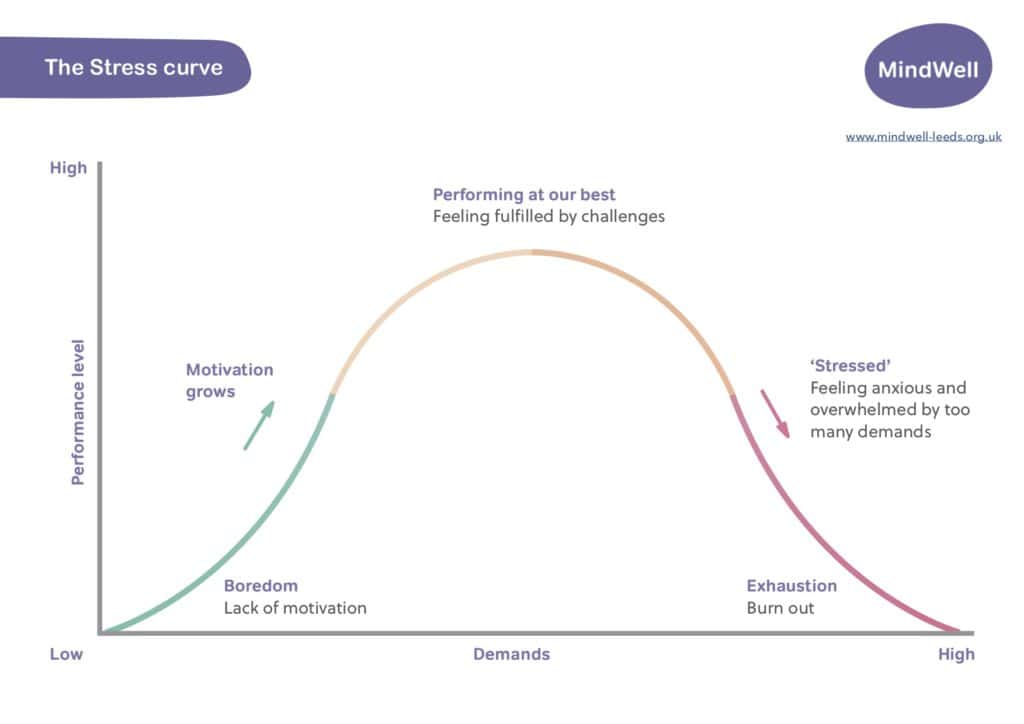When I retired early, a large part of it was to move away from the stress that running a business, managing employees, and last-minute travel, ALL while trying to be there for my growing family.
And it was in that mini-retirement that I realized I was so burnt out that I could barely even look at a computer without it giving me a headache or causing me stress.
I didn’t choose to retire early, it chose me.
Obviously, when you decide to retire early, you are largely doing it to walk away from the stress and the bullshit that today’s society provides all too often.
But stress always finds its way back. Always.
Because a little stress is a part of life.
In a way, stress is a part of you, in just the same way that 39 trillion bacteria are a part of you.
You don’t realize that you need the bacteria, but you do.
You don’t realize that you may need a little stress, but you do.
Yet if either tips the balance in one direction or the other, it can cause utter disaster!
Why Some Stress is Good
We, humans, can’t avoid stress…we seek it. We need it.
While chronic stress can be harmful, some stress can be beneficial in moderation.
Ultimately, like bacteria, a little stress is our friend, and it’s our natural instinct.
If you were a hunter-gatherer, you relied on stress to help alert you to potential dangers and point you to potential solutions.
Hunter-gatherers used stress to help enhance alertness and performance in situations that required heightened focus, known as the “fight or flight” response.
In the same way, as a modern-day human, you want to use stress as a motivating force to push you to meet deadlines and achieve your goals.
Stress helps you meet your daily challenges and motivates you to reach your goals, ultimately making you a smarter, happier and healthier person. That’s right. Good stress is vital for a healthy life.
– Stress Management: How to Tell the Difference Between Good and Bad Stress, Summa Health
Facing and overcoming stress can build resilience and coping skills, fostering personal growth and adaptability in the face of life’s challenges.
This is why I’ve said time and time again, that there is no such thing as failure.
When you push yourself, and face your fears, you grow. Full stop.
Even the worst investing or personal disasters are learning opportunities – it may take you months or years to realize it, but the hard things we go through, the stressful things, they help to make you who you are today.
Your failures and your stresses – they help propel you forward!
Stress Always Finds A Way
But of course, with all things, there is a need for balance.
And that is the entire point of this article.
Some stress, like some bacteria, is good for you, but too much can be very, very bad.
I left the workforce to have less stress in my life, but inevitably I managed to add back a ton of stress by managing my finances, acquiring an affiliate website, volunteering to coach both of my kids’s soccer teams, etc.
I spent all this time stripping away stress only to add it all back fairly quickly!
But I don’t think it’s just me. I think we all do this, all the time.
We cut away stress, only to add it back in some other way.
We quit a stressful job, only to take on a new, even more stressful one!
We stop volunteering at the school, but then we start coaching soccer.
When we subtract, we add something right back in there. It’s nuts!
Stress finds its way back time and time again!
So how on earth do we find better balance when there’s always more to do?
Analyzing Your Stress Curve
The answer I’ve found is in being mindful of your stress curve:

As you can see too little stress, and we are bored.
This is a common complaint of some retirees and also of those working worried that they won’t have anything to do.
But as you add in some activities, commitments, and stressors, you begin to grow out of the boredom and into a more fulfilling place.
A majority of Americans find their path way past the “peak performance” zone and into the far right.
This is where I was when I left my job. I was already there, exhausted!
And it’s not just me, my wife who is a stay-at-home Mom, has been there many times before. Because even if you don’t have a job you can take on too much!
So the best thing we can do is to take stock:
- Ask yourself where you are on the curve?
- Then ask yourself what you can add or subtract to get back into peak performance?
Once you take stock you’ll have a better idea.
Most of us know already if we are too stressed, or too bored.
But sometimes a good hard look is necessary to see if you are even telling the truth to yourself.
Most of the time, I am already way past my optimal stress levels, before I figure it out.
So if like me and many Americans you find yourself past peak, there are a few things you can do to help curb your stress levels:
- You can start to say “no” to any activities that aren’t a “hell yeah!”
- And you can take that one step further and create a list of automatic no’s
- Learn to be OK with taking a step back and being unproductive
- Focus on doing less, personally and professionally
- Track your time and see where you can improve it
- Get more sleep: make sure you are sleeping at least 7-8 hours a day
- Use lists to help manage the load
- Delegate: Move things off your to-do list and onto your employees’ or spouses’ list
- And sometimes the best way to get some things off of your plate is to take more vacation and let the things take care of themselves
- Finally, track your happiness and focus on the activities that make you the most happy.
Those are the things that I do at least..what do you do?
Just remember to always keep your pulse on your own stress levels, and when you feel yourself going one way or the other, be sure to make an adjustment.
Conclusion
We all have stress – even early retirees!
A little stress is good for you and perfectly healthy.
But the best thing you can do is monitor yourself to make sure that you don’t overload yourself for too long.
It’s why I cut away my play portfolio and focus on a simple investing plan.
It’s why I journal daily and track my time and happiness.
It’s why I focus my life on maximizing vacation days and relaxation.
But I don’t want to be completely stress-free. That is why I write on AR, volunteer to coach my kid’s soccer team, and work on my affiliate website.
Like bacteria, some stress is good. You just don’t want an overgrowth!

